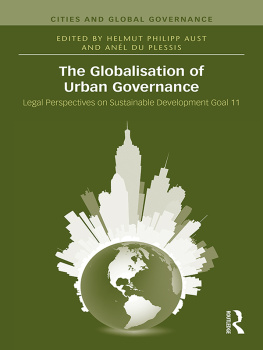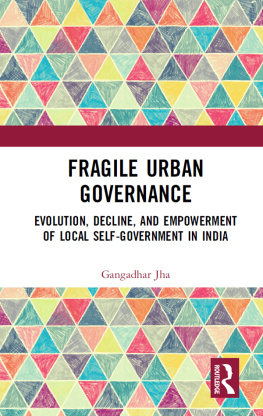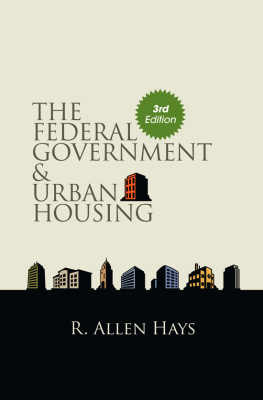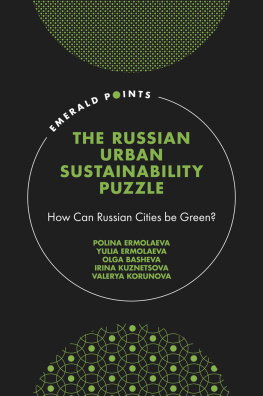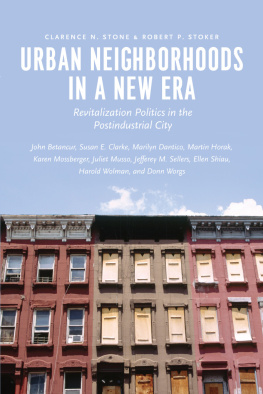Preface
As students of urban politics and federal policy implementation we began a collaborative effort more than a decade ago to examine the relationships among policy design, local governance, and neighborhood outcomes. Much of the urban literature has studied these topics from one of two approachescase studies of the local politics of policy implementation or evaluations of the effects of federal interventions in urban communities. Few studies have connected process and outcomes.
This book is an effort to do just that, in the hope of improving the knowledge base that supports efforts to revitalize distressed neighborhoods. The Clinton Administrations Empowerment Zones and Enterprise Communities initiative (EZ-EC), launched in 1994 as perhaps the federal governments most ambitious effort to revitalize distressed neighborhoods, provides an opportunity to examine the connections between local processes and outcomes. Each of the original EZ cities (Atlanta, Baltimore, Chicago, Detroit, New York, and Philadelphia-Camden) received a $100 million block grant and access to a variety of federal policy tools that included federal tax incentives, private facility bonds, waivers of regulatory barriers, and preferential treatment for federal aid to assist in carrying out projects and programs to transform their most distressed neighborhoods.
From 19921994, Michael Rich served as the founding executive director of the Providence Plan, a new intermediary organization that led the city of Providence through the strategic planning process and prepared the citys application for designation as an enterprise community, which the city received in 1994. In 1995, Rich, who had then joined the political science faculty at Emory University, and Robert Stoker of the George Washington University became field research associates for Atlanta and Baltimore, respectively, in the national evaluation of the EZ-EC initiative commissioned by the U.S. Department of Housing and Urban Development (HUD). We completed field research in our respective EZ cities for the Rockefeller Institute of Governments Implementation Assessment (from 1995 through 1997) and continued in those roles in HUDs second evaluation of the EZ-EC initiative, the Interim Outcomes Assessment (from 1998 through 2001), which was directed by Abt Associates and the Urban Institute.
As the Interim Outcomes Assessment wound down, we agreed to continue research in our respective cities and explored the possibilities of writing a summative evaluation of the six original urban EZs. After discussions with several publishers, we embarked on a book-length project that would use the experiences of the EZs to assess the efficacy of collaborative approaches to urban revitalization, paying particular attention to the linkages between policy design (tensions between market and government policy tools), policy implementation (breadth and depth of governance structures and processes and capacity to act), and neighborhood outcomes (what happened in distressed neighborhoods). However, in contrast to other evaluations of the EZ-EC initiative, our evaluation focused on local outcomes and processes. Rather than asking whether the EZ-EC initiative worked, we asked how and why it worked in some cities but not in others.
Many colleagues contributed to this project. Richard Nathan and David Wright of the Rockefeller Institute of Government directed the EZ-EC Implementation Assessment. Scott Hebert of Abt Associates and Avis Vidal of the Urban Institute directed the EZ-EC Interim Outcomes Assessment. Colleagues who served as field research associates in the other EZ cities were: Chicago (Charles Orlebeke), Detroit (Robin Boyle), New York (Elizabeth Mueller, Kian Tajbakhsk, and Brian Sahd) and Philadelphia-Camden (Robert Bailey). We gratefully acknowledge their contributions to our understanding of the EZ effort in their cities.
Support for the early rounds of the Atlanta field research was provided by Micheal Giles, who provided introductions to many of the citys key government, business, civic, and community leaders, and Robert Brown, as well as a number of very capable graduate students who scheduled and summarized interviews, chased down numerous documents and reports from a variety of local groups and organizations, gathered an extensive inventory of newspaper articles on the Atlanta EZ effort, and compiled a comprehensive history of Atlanta Empowerment Zone meetings and events. These include Doug Alexander, Heather Dash, Virginia Hettinger, Gibbs Knotts, Elizabeth Stiles, Aristide Sechandice, and Laurel Parker West. A special note of thanks goes to Adrienne Smith, who did a superb job coding and reconciling expenditure data on the uses of EZ funds in the six EZ cities and compiling information on each citys local governance structure.
We would also like to thank several people who provided valuable assistance, background and referrals on the EZ efforts in their cities. In Chicago, Chuck Orlebeke; in New York, John Mollenkopf; in Detroit, Robin Boyle; and in Philadelphia, David Bartelt, Eva Gladstein, Ira Harkavy, Deborah McColloch, and Wendell Pritchett.
Several scholars and practitioners provided valuable comments on the manuscript or conference papers that included material later incorporated into the manuscript. We appreciate the assistance of Henry Cisneros, Susan Clarke, Marvin Mandell, Karen Mossberger, Richard Nathan, Clarence Stone, and Chris Walker.
We are also grateful to colleagues at our home institutions. At Emory, Micheal Giles and Richard Doner offered very helpful comments and insights on the entire manuscript, and David Nugent and Moshe Haspel commented on selected chapters. In addition, Moshe Haspel provided assistance with data management and wrote Stata scripts that facilitated the analysis reported in chapter 5. At George Washington University, Jeffrey Henig, Paul Wahlbeck, and Harold Wolman provided valuable assistance and support.
We are also grateful to Michael Leo Owens and Thomas Remington, co-organizers of the conference A Global Look at Governance: The State-Market-Civic Nexus, sponsored by Emorys Claus Halle Institute for Global Learning, for the opportunity to present a preliminary version of our analysis. We also wish to thank Barbara Haley of HUD for the opportunity to present a summary of our analysis to HUD staff and other researchers in the Washington, DC, area. In particular, we wish to thank Judson James from HUDs Office of Policy Development and Research, and Bill Barnes, research director at the National League of Cities, for their helpful comments and observations at that gathering.
The empirical analysis of revitalization outcomes reported in chapter 5 evolved over the course of the project. We appreciate the comments and suggestions offered by several colleagues including Thomas Cook of Northwestern University, Michael Oakes of the University of Minnesota, and Kyle Beardsley David Davis, and Lance Waller from Emory University. We are especially grateful to Professor Oakes for his telephone and email consultations on the early phases of the analysis, his careful reading of various drafts of chapter 5, and his many helpful suggestions for creating a rigorous evaluation in a real world setting that posed challenges for conventional data analysis methods.


